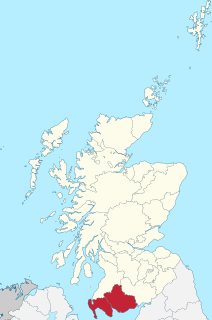
Galloway is a region in southwestern Scotland comprising the historic counties of Wigtownshire and Kirkcudbrightshire.

Roger de Quincy, 2nd Earl of Winchester ,) hereditary Constable of Scotland, was a nobleman of Anglo-Norman and Scottish descent who was prominent in both England and Scotland, at his death having one of the largest baronial landholdings in the two kingdoms.

Earl of Carrick or Mormaer of Carrick is the title applied to the ruler of Carrick, subsequently part of the Peerage of Scotland. The position came to be strongly associated with the Scottish crown when Robert the Bruce, who had inherited it from his maternal kin, became King of the Scots in the early 14th century. Since the 15th century the title of Earl of Carrick has automatically been held by the heir apparent to the throne, meaning Prince Charles is the current Earl.
The sovereign or feudal lordship of Argyle was the holding of the senior branch of descendants of Somhairle, this branch becoming soon known as Clan MacDougall

The lords of Galloway consisted of a dynasty of heirs who were lords and ladies who ruled over Galloway in southwest Scotland, mainly during the High Middle Ages. Many regions of Scotland, including Galloway and Moray, periodically had kings or subkings, similar to those in Ireland during the Middle Ages. The Scottish monarch was seen as being similar to a high king. The lords of Galloway would have either paid tribute to the Scottish monarch, or at other times ignored him. The Lords of Galloway are fairly well recorded in the 12th and 13th centuries, but the records are incomplete or conflicting at other times. Later on, the kings were known as "lords" at the Scottish court, and "kings" at home, finally becoming "lords" in both arenas.
Uchtred mac Fergusa was Lord of Galloway from 1161 to 1174, ruling jointly with his half-brother Gille Brigte (Gilbert). They were sons of Fergus of Galloway; their mothers' names are unknown, but Uchtred may have been born to one of the many illegitimate daughters of Henry I of England.
Gille Ruadh was the Galwegian leader who led the revolt against King Alexander II of Scotland. His birth, death date and origins are all unknown.
Gille Brigte or Gilla Brigte mac Fergusa of Galloway, also known as Gillebrigte, Gille Brighde, Gilbridge, Gilbride, etc., and most famously known in French sources as Gilbert, was Lord of Galloway of Scotland. Gilla Brigte was one of two sons of the great Fergus, the builder of the "Kingdom" of Galloway.
Galwegian Gaelic is an extinct dialect of the Goidelic languages formerly spoken in southwest Scotland. It was spoken by the people of Galloway and Carrick until the early modern period. It was once spoken in Annandale and Strathnith. Little has survived of the dialect, so that its exact relationship with other Goidelic languages is uncertain.

Fearchar of Ross or Ferchar mac in tSagairt, was the first of the Scottish Ó Beólláin family who received by Royal Grant the lands and Title of Mormaer or Earl of Ross (1223–1251) we know of from the thirteenth century, whose career brought Ross into the fold of the Scottish kings for the first time, and who is remembered as the founder of the Earldom of Ross.

Archibald Douglas, Earl of Douglas and Wigtown, Lord of Galloway, Douglas and Bothwell, called Archibald the Grim or Black Archibald, was a late medieval Scottish nobleman. Archibald was the bastard son of Sir James "the Black" Douglas, Robert I's trusted lieutenant, and an unknown mother. A first cousin of William 1st Earl of Douglas, he inherited the earldom of Douglas and its entailed estates as the third earl following the death without legitimate issue of James 2nd Earl of Douglas at the Battle of Otterburn.
Thomas MacDowell was Bishop of Galloway (1359–1363). He had previously been rector of the parish of "Kyrteum", and so was certainly a native of Galloway, as his Gaelic name further suggests. He was provided to the see by Pope Innocent VI sometime before December 1359. He was consecrated at Avignon by Cardinal Peter, Bishop of Ostia. He appeared in the records for the last time in a document dating to September, 1362, along with the Bishop of Dunkeld and the Bishop of Brechin as an arbitrator in a dispute between the chapter of Glasgow and its bishop. His successor, Adam de Lanark, was provided to the see in November 1363, so it is probable that Thomas died sometime in the early part of 1363.

Clan Macdowall is a Scottish clan.
The Prior of Whithorn was the head of the monastic community at Whithorn Priory, attached to the bishopric of Galloway at Whithorn. It was originally an Augustinian establishment, but became Premonstratensian by the time of the second or third known prior. As most of the priors of Whithorn appear to be native Galwegian Gaels, it would appear that most priors before the 16th century at least were drawn from region, something unusual in medieval Scotland. The following is a list of abbots and commendators.
Malcolm Fleming, Earl of Wigtown was the son of Robert Fleming, a Stewart vassal and holder of the lands of Fulwood and Cumbernauld, who died sometime before 1314. He was the "foster-father" of King David II of Scotland and became the first man to hold the title Earl of Wigtown.
Tomás Mac Con Iomaire, Irish radio producer and journalist.
The Battle of the River Dee was a battle fought on 29 June 1308 during the Scottish Wars of Independence near Buittle, on the banks of the River Dee, Galloway, Scotland.






